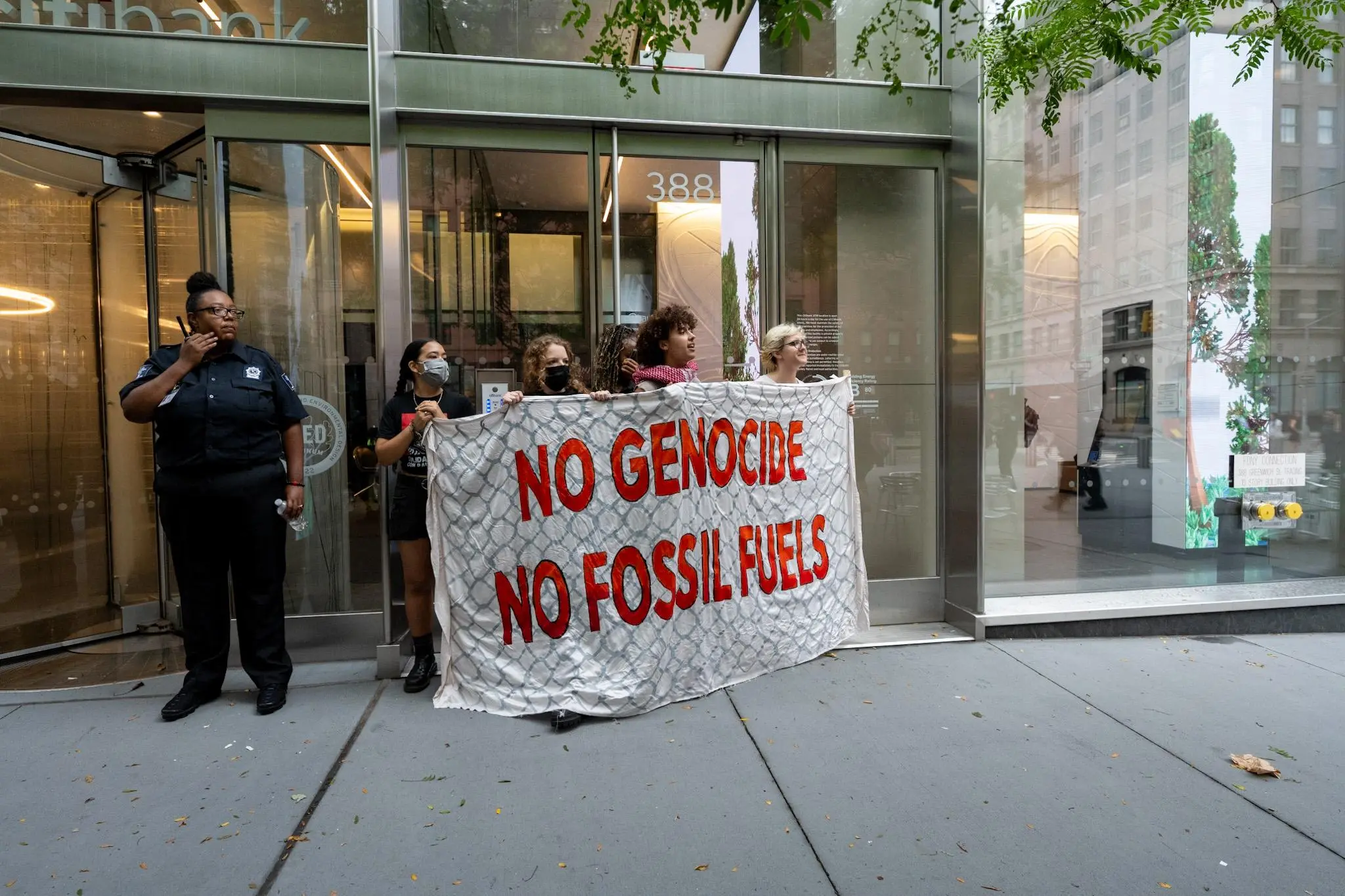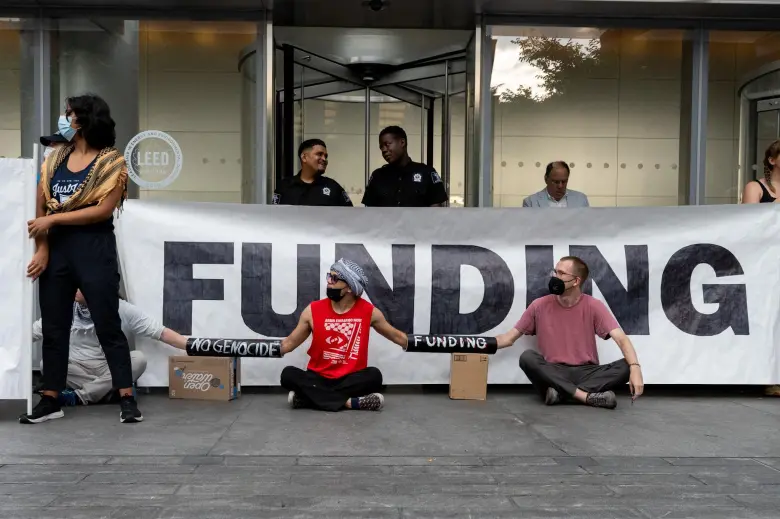Yves: I’ve found that protests are a very long and difficult process. It takes a long time to delegitimize powerful stakeholders and organizations so that they change course. And they tend not to change course in a satisfactory way. For example, they try to pretend that they were the first among their peers to move away from positions that are now recognized as regressive.
I am not sure about the usefulness of linking Gaza and climate change as issues, at least not because of the impact of the US’s massive military power and its insistence on supporting Israel no matter how bad its actions are, which leads us to commit more resources to a war of attrition that neither the US nor Israel want to wage.
The article is not as clear as I would like about how strongly Stop the Heat protesters link the two. I would be happier if they were protesting arms investment in general and using Gaza as a poster. Note that some groups in the movement do.
However, it is worth pointing out (for all you involved with student protests, as they will be coming to campus soon) that large financial institutions like Citigroup have a much more powerful influence on the Israeli economy than endowment investments, which have done very little to help Israel (apart from their small share in venture capital investments). In general, endowments and pension funds put the overwhelming majority of their money into existing investments (specifically the secondary market); they are not funding economic activity such as loans to Israeli companies, providing trade finance, or making meaningful new equity investments (e.g. very little venture capital participation).
Perhaps the message is more far-reaching than this article suggests, but as reported, Citigroup’s efforts appear to be focused on divestitures, even though loans and trade support are more important to the Israeli economy.
This doesn’t mean that pro-Palestinian university protesters should stop trying to get university endowments to divest from Israel-related assets. Universities are very prestigious. Even a mere or largely symbolic acknowledgement of Israeli genocide would have real impact. That’s why Zionist billionaires have come so hard on university leaders to quell the demonstrations.
But these activists should broaden their focus to include large banks, given that they have more direct influence over them.
Yesenia Funes is Editor-in-Chief of the independent magazine Atmos and the founder of the creative climate newsletter Possibilities. Her work has appeared in The Guardian, Vogue, National Geographic, Vox, Scientific American, and more. Yale University Climate

When Ricky Gonzalez began organizing pro-Palestinian protests in New York City this year, he never expected the work would eventually lead him to the glass doors of Citigroup’s headquarters.
On a windy July morning, the 29-year-old activist rushed to block the building’s entrance with about 20 others. Gonzalez was wearing a red muscle T-shirt that read “Arms Embargo Now.” With a white-and-black kaffiyeh wrapped around his head, he sat on the concrete in front of Citigroup’s entrance. His arms were pinned to black PVC pipes that read “No to Financing Genocide” in bold white letters.
“Hey, Citi! Stop it! Put the planet before profits,” the group chanted, delaying Citigroup employees from entering the office for about 30 minutes.
The protests were the result of a nascent coalition of activists targeting the multinational investment bank Citigroup over two seemingly opposing issues: the Israeli-Hamas war in the Middle East and global climate change.
of campaign The “Summer of Heat” movement, led by groups including Stop the Money Pipeline and New York Communities for Change, includes calls for Citigroup to stop funding fossil fuel companies, rapidly increase funding for renewable energy and contribute to a compensation fund. United Nations Foundation The aim was to help poor countries recover from the economic damage caused by climate change. It is called They called on the City to stop investing in companies that manufacture weapons for Israel.
Since June, protesters have staged more than a dozen actions to draw attention to the bank’s investments, including falling to the ground to symbolize death from climate change. The New York Police Department has arrested about 456 people in connection with the protests.
Climate impacts of war
The Israel-Hamas war would begin on October 7, 2023, when Hamas and other Palestinian militant groups would attack Israel and 1,200 They took about 250 hostages, and Israel responded with bombings and an invasion of Gaza, resulting in deaths. Over 40,000 Palestinians and millions of displaced people. More than 300 Israeli soldiers were killed in the fighting. Tens of thousands Israeli civilians were also forced to evacuate.
War itself is a major polluter that contributes to global warming, wherever it occurs. estimate Israel’s bombing and invasion of Palestine resulted in the release of at least 281,000 tons of carbon pollution in the first 60 days of the war, the result of the burning of fossil fuels by planes, tanks and other vehicles, and pollution from bombs, artillery and rockets.

“We know that the military-industrial complex – war – is a huge driver of environmental injustice and the climate crisis. We can’t address the climate crisis unless we address militarism,” said Alec Connon, president of the Stop the Money Pipeline coalition, which represents more than one million politicians. 200 The groups were focused on institutions that fund fossil fuel projects. Konon was among those arrested at a Citigroup protest in July.
The war has also galvanized many young people into organizing, some of whom first discovered it at recent student-led pro-Palestinian camps and demonstrations across the country, including at Yale University, which has frequently called for divestment from companies in or that do business with Israel. Protests against Citigroup in New York have drawn activists as well as older activists, immigrants and people from the Gulf South, a hotspot for migration. Fossil fuel expansionHe was in the city to take part in the protests.
Gonzalez’s activism began to bud during the Black Lives Matter movement in 2020, but it blossomed to new heights this year as he helped organize protests. Shut it down for Palestine Then he began to see connections between the broader climate crisis, fossil fuels and America’s ties to oil-rich countries in the Middle East.
“We depend on oil,” he said, “but at the end of the day, oil is a finite resource that has geopolitical implications.”
Gonzalez was first arrested in May along with about 150 others for blocking traffic on the Manhattan Bridge, but that wasn’t the last time he was seen leaving a protest in handcuffs: He was arrested again in July during a lockbox action outside Citigroup’s headquarters.
In lockbox actions, protesters may lock their arms into PVC pipes to create a blockade. Lockboxes are considered a dangerous form of direct action because police may injure participants if they are not careful when removing their arms.
Gonzalez said he had no choice but to take the risk.
“this is The hottest summer “This is something I’ve never experienced before,” he said as police led him into a van for his arrest. “If you wait until it happens in your backyard, it’ll be too late.”
Why Citigroup?
Campaign organizers began targeting Citigroup three years ago, said Alice Hu, a climate campaigner and lead organizer for the activist group New York Communities for Change. They decided to step up the pressure this year because temperatures are rising in New York, where the bank is headquartered. Summer isn’t even over, but New York City has already been hit by a four-degree heat wave.
What began as a climate change initiative quickly expanded in scope.
“It is impossible to ignore what has happened since Oct. 7,” Hu said.
Estimates vary as to how much Citigroup has lent to fossil fuel companies: One research firm said the bank committed $396 billion in loans, debt assumptions and equity offerings to fossil fuel companies between 2016 and 2023. Report According to environmental group and independent research organisation Profundo.
Bloomberg Reported While Citigroup’s fossil fuel financing has declined in recent years, it remains the sixth-largest financial institution to finance fossil fuels since the signing of the Paris Agreement in 2015. Publicly Promised Citi has committed to being net zero by 2050 and committing $1 trillion to the low-carbon transition. Acknowledged Nearly half of the company’s energy customers lack plans to move away from oil, gas and coal.
Citigroup at the United Nations General Assembly on June 20 statement The statement calling for an end to arms transfers to Israel was signed by a number of corporations and financial institutions with investments in arms-related companies, including Citigroup, Bank of America, JPMorgan Chase and BlackRock.
“Failure to prevent or mitigate business relationships with these arms manufacturers transferring weapons to Israel could transform them from direct links to human rights violations to contributing to human rights violations, with the potential impact of complicity in atrocities crimes,” the statement said.
The city did not respond to multiple requests for comment, and instead conducted an annual survey by Yale Climate Connections. Climate Report.
Bigger than the City
Big financial institutions have largely ignored calls to phase out fossil fuels, said Jenny Stevens, a climate justice professor at the National University of Ireland, Maynooth. Over the years, individual banks have pledged to stop funding specific projects, such as coal and Arctic fossil fuel exploration and drilling. But these actions have done little to stop money flowing to the fossil fuel industry as a whole. While dollars have fallen over the past few years, the world’s 60 major private banks Since the adoption of the Paris Agreement in 2016, $6.9 trillion has been invested.
“It’s really important that the protesters are focusing on finance and banking because that’s a key component of long-overdue change,” Stevens said. “Right now there’s a mismatch between climate policy and financial regulation.”
Banks are required to make as much profit as possible, which makes it difficult to move away from fossil fuels, which have historically been a source of high profits. Solving this conundrum requires central banks to act to change the way financial institutions operate, Stevens said.
For example, what would happen if we imposed high interest rates on loans to polluting industries?
“We want to encourage things that are good for society and discourage investments and things that we know are destructive,” she said.
Stevens added that while the problem is systemic, if Citigroup agreed to stop financing fossil fuels it would be a strong step in the right direction — a hope shared by activists.
“If we can unleash one U.S. bank’s move on fossil fuel financing, other banks will follow suit,” Hu said.
So far, activists have secured one meeting with Citigroup, where people directly affected by climate change attended and shared their experiences with executives including chief sustainability officer Val Smith and Eliza Eubank, managing director and global head of environmental and social risk management. Activists recall that Citigroup employees presented attendees with their climate action plan. Connon, who attended the meeting, said he characterized it as a “stalemate.”
Regardless of how the bank moves forward or how the war between Israel and Hamas is resolved, Gonzalez says it’s just the beginning.
“We are climate activists,” he said, “and our activism doesn’t end with a ceasefire. And honestly, there’s always more to do.”








